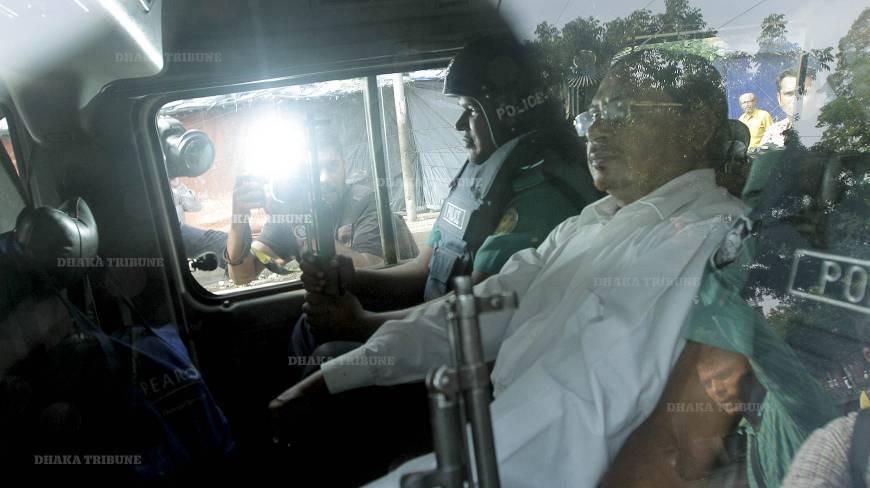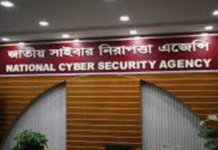A two-hour-long drama outside the Dhaka Central Jail last evening – occasioned by a remark by State Minister for Home Affairs Asaduzzaman Khan Kamal – kept everyone in anticipation of developments inside the prison with respect to the execution of convicted war criminal Muhammad Kamaruzzaman.
Until then, it was official that Kamaruzzaman had not given a final decision on seeking presidential mercy when two magistrates visited him in the morning.
Earlier in the evening, those at the jail gate presumed that execution might be imminent as security measures were beefed up in the area upon the directives of a minister. After nearly an hour, the jail doctor entered the prison.
But around 9:15pm, the Lalbagh police deputy commissioner and Senior Jail Superintendent Forman Ali left the central jail, while security measures relaxed after 9:30pm. Generally, these officials witness execution of convicts at the Dhaka Central Jail.
There was, however, no official statement on these developments, one way or the other.
Kamaruzzaman’s family members told a private television channel that they had not been formally informed about any decision.
The Jamaat-e-Islami leader yesterday sought more time, for the third time since he was communicated the apex court judgement, to decide whether he would walk the gallows or seek presidential mercy, his only lifeline at this stage.
Around 8pm, State Minister for Home Asaduzzaman Khan Kamal at a programme said the convict would not get more time to take decision on whether he would seek presidential mercy: “The Jamaat leader was given adequate time to file the mercy petition. Earlier in the day, two magistrates visited the jail in order to talk to him over the issue. But, he is taking too much time.”
Kamal on Thursday afternoon said the district magistrate was on his way to meet Kamaruzzaman.
When the magistrates met the death row convict yesterday morning and tried to convince him to give his decision, Kamaruzzman did not say yes or no. He just said he needed time.
Talking to the Dhaka Tribune, Dhaka Deputy Commissioner Md Tofazzel Hossain Miah said magistrates Mahbub Jamil and Tanjim Mohammad Azim went to the jail to meet Kamaruzzaman at 10:15am. They came out at 11:40am but did not make any comment before the media.
Forman Ali and Jailer Nesarul Alam accompanied the magistrates.
When approached, Forman Ali said he was unaware of the magistrates’ purpose: “Magistrates often come to jail, it is a routine job.”
The state minister for home affairs on Thursday said the convict would have to make a decision on the matter by the night.
According to sources seeking anonymity, Kamaruzzaman had requested jail authorities to execute him on a Friday and asked that his body be buried without a funeral bath.
Earlier, the Appellate Division judges took two days to sign the judgement that they gave on Monday upholding the death penalty of the Jamaat-e-Islami leader.
The jail authorities received the copy of the judgement on Wednesday and communicated it to the convict. But Kamaruzzaman, a key al-Badr organiser during the 1971 Liberation War, on Wednesday and Thursday sought time to make his final decision.
As per the jail code, a convict gets a week to seek presidential mercy after the jail authorities receive the death warrant and communicate it to him. But Attorney General Mahbubey Alam earlier said the jail code was not applicable in war crimes cases. The sentence would be executed
as per the direction of the government in line with the International Crimes (Tribunals) Act of 1973.
Kamaruzzaman is the second war crimes convict who filed a review petition with the top court. Jamaat leader Abdul Quader Molla was executed on December 12, 2013. He did not seek mercy. The death sentence of another Jamaat leader Delawar Hossain Sayedee was commuted to life-term by the apex court.
After the Appellate Division pronounced its judgement rejecting the review petition, New York-based Human Rights
Watch and the UN Human Rights Council asked the government to halt the execution and ensure a fair review of the trial as, according to them, it did not meet acceptable standards.
The European Union, which advocates for abolishing capital punishment, also asked the government to impose a moratorium on execution.
Execution is in effect in at least 52 countries of the world as well as in 32 states of the US.
In protest against the apex court judgement, Jamaat observed hartal on Tuesday and Wednesday, labelling it a judicial killing.
Kamaruzzaman has been in jail since July 29, 2010 when he was arrested in a case of hurting religious sentiment. He was shown arrested in the war crimes case on
October 2 the same year. The trial began on July 2, 2012.
The war crimes tribunal on May 9, 2013 awarded Kamaruzzaman death penalty on two out of five charges proved against him. He was sentenced to life term for two other charges and 10 years’ imprisonment in a fifth. He was acquitted on two charges.
Kamaruzzaman challenged the verdict at the Appellate Division on June 6, 2013. The apex court upheld the tribunal verdict on November 3 last year but commuted his
death sentence to life imprisonment on one charge – the abduction and killing of Golam Mostafa.
The Jamaat leader was given capital punishment for the massacre of Sohagpur, now known as “Bidhoba Palli,” or the village of widows. He advised members of al-Badr and Razakar forces on July 25, 1971 to commit a large-scale massacre in association with the Pakistani occupation forces at Sohagpur under Nalitabari upazila in Sherpur. The collaborators murdered 164 unarmed civilians, 44 of whom have been named, and raped many women.
The full text of the verdict was released on February 18 and the tribunal sent Kamaruzzaman’s death warrant to the Dhaka Central Jail the following day. He filed the review petition on March 5.
In 1971, Kamaruzzaman was a top leader of greater Mymensingh unit Islami Chhatra Sangha, then student wing of Jamaat. He was also the office secretary of East Pakistan unit Chhatra Sangha.
He played the role of a key organiser in the formation of the infamous al-Badr force with the selected students belonging to Chhatra Sangha.
‘Sohagpur massacre horrendous’
In its verdict, the tribunal said: “The fierceness of the event of the attack was launched in such grotesque and revolting manner in which the helpless victims, the unarmed hundreds of civilians, could not save their lives and honour.
“The act of massacre and devastation of human honour was diabolic and detrimental to basic humanness.”
Kamaruzzaman by his acts and conduct had participated in the perpetration of such horrendous attack that resulted in murder of hundreds of unarmed civilians constituting the offence of crimes against humanity, the tribunal verdict said.
It also observed that the act of mass sexual assault committed on women, in conjunction with the mass killing at Sohagpur village, shocks the conscience of humankind and aggravates the criminal liability of Kamaruzzaman as well.
Three rape victims, who also lost their husbands in the Sohagpur massacre, standing in the dock of the tribunal, narrated the trauma and demanded justice for the sexual assault and dishonour they suffered.











Shame on you.After 45 years you decided to try this man.What was his age at that time? only 18 years.Get lost you traitors